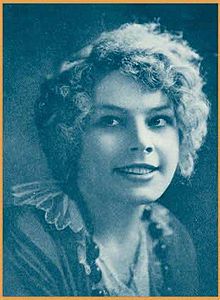fiction.wikisort.org - Actor
Cleo Ridgely (Nueva York, 12 de mayo de 1893 - Glendale, California, 18 de agosto de 1962) fue una actriz cinematográfica estadounidense, cuya carrera, iniciada en 1911 en la época del cine mudo, se prolongó a lo largo de cuarenta años. Retirada en los años 1930 volvió al cine con posterioridad, rodando su último film, Hollywood Story, en 1951.
| Cleo Ridgely | ||
|---|---|---|
 | ||
| Información personal | ||
| Nombre de nacimiento | Freda Cleo Helwig | |
| Nacimiento |
12 de mayo de 1893 | |
| Fallecimiento |
18 de agosto de 1962 | |
| Causa de muerte | Enfermedad | |
| Sepultura | Forest Lawn Memorial Park | |
| Nacionalidad | Estadounidense | |
| Lengua materna | Inglés | |
| Familia | ||
| Cónyuge | James W. Horne, Richard Ridgely | |
| Hijos | June Horne, James Wesley Horne Jr. | |
| Información profesional | ||
| Ocupación | Actriz | |
| Años activa | desde 1911 | |
Biografía
Nacida en Nueva York, su verdadero nombre era Freda Cleo Helwig. Sus padres eran August Helwig y Catherine Emily Sommerkamp, y tenía dos hermanas, Christina y Martha.
Ridgely protagonizó con Ruth Roland un serial sobre una detective en los años 1920, y actuó en diferentes producciones junto a Wallace Reid y Lew Cody. La actriz participó en filmes de la Famous Players-Lasky Film Company y de Paramount Pictures.
Fue seleccionada reina de la exposición que la Auburn Automobile Company presentó en el show automovilístico de Los Ángeles, California, en octubre de 1915. En una foto de la época la actriz posaba con un Auburn Six de 1916.
Cleo Ridgely falleció en Glendale, California, en 1962. Murió en su casa, a los 69 años de edad. Fue enterrada en el Cementerio Forest Lawn Memorial Park de la mencionada población. Había estado casada con James W. Horne, director de muchas de las comedias de Stan Laurel y Oliver Hardy. Antes había estado casada con Jaudon M. Ridgely, también conocido como Richard Ridgely.
Filmografía completa[1]
Referencias
- Lima, Ohio, Times-Democrat, What's The Price of Film Stardom? Cleo Ridgely Says, Defiance of Death, 6 de mayo de 1916, Página 9.
- Los Angeles Times, Cleo Ridgely To Be Auburn Queen at Broadway Show, 19 de septiembre de 1915, Página VII.
- Los Angeles Times, Pen Points, 10 de diciembre de 1916, Página II4.
- Los Angeles Times, Rites Set Today for Mrs. Horne, Former Actress, 21 de agosto de 1962, Página 21.
- Los Angeles Times, The Week In Review, 26 de agosto de 1962, Página GB2.
Enlaces externos
 Portal:Biografías. Contenido relacionado con Biografías.
Portal:Biografías. Contenido relacionado con Biografías. Wikimedia Commons alberga una categoría multimedia sobre Cleo Ridgely.
Wikimedia Commons alberga una categoría multimedia sobre Cleo Ridgely.- Cleo Ridgely en Internet Movie Database (en inglés).
- «Tumba de Cleo Ridgely» (en inglés). Find a Grave.
- Filmografía en AFI Archivado el 6 de abril de 2014 en Wayback Machine. American Film Institute
- Esta obra contiene una traducción derivada de «Cleo Ridgely» de Wikipedia en inglés, publicada por sus editores bajo la Licencia de documentación libre de GNU y la Licencia Creative Commons Atribución-CompartirIgual 3.0 Unported.
- Esta obra contiene una traducción derivada de «Cleo Ridgely» de Wikipedia en italiano, publicada por sus editores bajo la Licencia de documentación libre de GNU y la Licencia Creative Commons Atribución-CompartirIgual 3.0 Unported.
На других языках
[en] Cleo Ridgely
Cleo Ridgely-Horne (born Freda Cleo Helwig, May 12, 1893[1] – August 18, 1962) was a star of silent and sound motion pictures. Her career began early in the silent film era, in 1911, and continued for forty years. She retired in the 1930s but later returned to make more movies. Her final film was Hollywood Story (1951), in which she had a bit part.- [es] Cleo Ridgely
Другой контент может иметь иную лицензию. Перед использованием материалов сайта WikiSort.org внимательно изучите правила лицензирования конкретных элементов наполнения сайта.
WikiSort.org - проект по пересортировке и дополнению контента Википедии